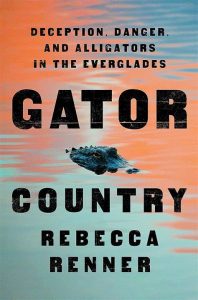
By Sharon Geltner
Gator Country opens with an authentic Florida adventure.
A 7-year-old Central Florida girl explores a swamp by herself. Rebecca Renner’s dad tells her: “When it starts getting dark, come back.” Family dinner could be alligator meat, breaded in cornmeal, fried in peanut oil.
Orlando resident Renner writes: “I hadn’t quite grasped the majesty and danger of the natural world that surrounded me. Down at Spruce Creek, I crossed a muddy stream on a fallen palm log. A foot below me, the water was black, dyed like tea by oak leaves. I was set on reaching a sandy peninsula, half hidden by saw palms, that jutted out into the creek proper. Stepping down at the end of the log, I slipped. When I tried to catch my balance, my other foot landed in in the water, and I sank up to my thigh. Was this that ubiquitous childhood danger, quicksand? Would I sink deeper if I struggled?
“Then a reflection, like a ray of light on the polished gems I collected, drew my eye to the peninsula. Now in full view, I saw that the small stretch of sandy beach was already occupied by a half-ton alligator. The creature had a hide like an old tire and eyes like fossilized amber…”
I dare you to stop reading!
Gator Country is filled with stunning evocations of nature, packed with details about Lake Okeechobee, Big Cypress National Preserve, Everglades National Park and the dirty roads and tiny settlements in between.
For perspective: “Big Cypress National Preserve is larger than the state of Rhode Island. The entirety of New York City could fit inside it three times over, and there would still be room.”
Renner says she is determined to convey the real story of the Everglades, unlike many reporters who visit here. “They fail to be open to the real adventure, to the truth about the place, and to the real lives of the people that call it home; and they end up writing about stereotypical preconceptions.”
Gator Country is the “tale of a wildlife officer who disguised himself as a poacher to protect the swamp and the American alligator.”
Renner tracks down Jeff Babauta, who got off the grid after arresting many poachers in his elaborate sting, Operation Alligator Thief. This Manatee County wildlife officer and game warden with the Florida Fish and Wildlife Conservation Commission became an undercover poacher and then, disappeared for his own safety. Renner persuaded Babauta to reveal how he did it.
One recent estimate says there are 1 million gators in the state, with 30,000 in a single lake. So, why care that some eggs ($60 per when Babauta was investigating) will hatch and the creatures will be harvested and made into handbags?
Because if alligators disappear, which almost happened here in the 1950s, the entire ecosystem goes haywire, Renner warns. (There are echoes of Rachel Carson’s Silent Spring in Gator Country.) Renner says: “Our centuries of war with the swamp have shown that when we attack nature, nature will fight back, and both humans and nature will lose.”
Renner, a seven-plus-generation Floridian, proudly comes from “A long line of Crackers, the local name for Florida cattlemen and Floridianos, descendants of the first Spanish colonists to arrive in St. Augustine in 1565.” She also has French-Acadian Huguenot ancestors and a great-grandmother, a Gibson Girl, was a famed debutante in New Orleans.
Some ancestors were indentured servants brought from Minorca, a Mediterranean island, in the 1700s to St. Augustine and what is now New Smyrna Beach.
Renner won a table-setting contest and a hog calling contest, was a gold medalist at the National Lifeguard Championships and raised several Dixie dwarf rabbit fancier’s “best in show” rabbits. She also caught a snapping turtle with her bare hands.
Renner quit teaching 11th grade English in Deltona to write full-time. “In a matter of three years, I went from churning out clickbait for content mills to writing for the National Geographic and the New York Times.”
Renner may be emulating the late Peter Matthiessen, a naturalist and novelist. He wrote books about a real Florida sugar cane planter and outlaw who was murdered by his neighbors on Chokoloskee Island – gator territory. He’s the only writer to have won a National Book Award for fiction and nonfiction.
Renner has a real shot if she models accomplished writers from the past: In 1939, Christopher Isherwood opened The Berlin Diaries with, “I am a camera…” In 1952, Lillian Ross at The New Yorker pioneered “New Journalism.” The authors preferred to remain invisible. Their discipline imbued their factual articles with the description, detail and narrative power of a novel.
Renner often stops the momentum and dilutes the impact of her work by interjecting comments about her looks, interviewing skills, ingratiating manner, fun sense of humor, ability to charm sources who admire her, how much she cares, etc.
Ansel Adams didn’t need to post selfies. Gator Country is at its best when Renner stays out of the picture and allows her subjects to reveal themselves, without redundant remarks about their character, integrity and life choices.
Today, Renner is working on two books, a literary one about an art forger, the other a true crime story with dolphins. The latter at her agent’s suggestion.
“I’m putting it out there about the dolphins if anyone has a tip!” Renner said.
I hope someone does, if Renner could make reptiles heartwarming, think what she will do for dolphins.
Gator Country, by Rebecca Renner, Flatiron Books, 276 pp., $29.99.
Sharon Geltner is the author of Charity Bashed, a Palm Beach mystery and social satire, available on Amazon.